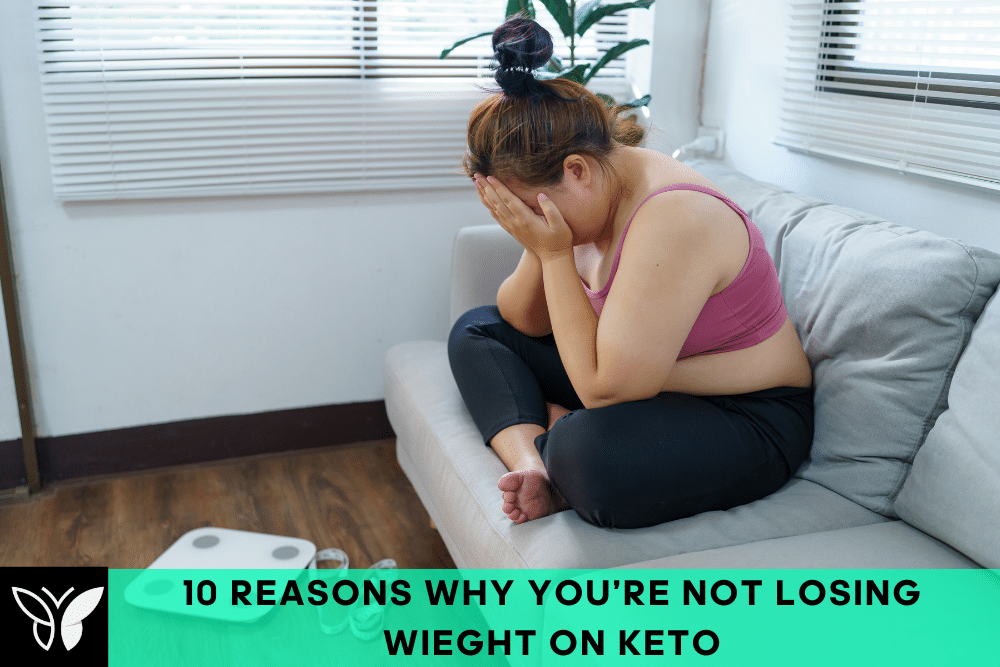Embarking on the ketogenic diet promises significant weight loss benefits, drawing countless individuals to this high-fat, low-carb lifestyle. Yet, a common frustration arises when expectations meet reality—not losing weight on keto.
This blog delves into the heart of this issue, unveiling the 10 pivotal reasons why you might not be shedding pounds on keto and, importantly, how to address them. Whether it’s overlooked dietary mistakes, hidden carbs sneaking into meals, or misjudged calorie intake, understanding these obstacles is the first step toward rectifying them.
By unlocking these secrets, we aim to reinvigorate your keto journey, ensuring you have the knowledge and strategies to overcome these hurdles. Stay tuned as we explore each reason in-depth, providing actionable tips to jumpstart your weight loss and harness the full potential of the ketogenic diet.
10 Reasons You’re Not Losing Weight on Keto
1. Calorie Surplus

On top of why you’re not losing weight on keto is the fundamental principle of a calorie surplus—eating more calories than your body burns. Despite the ketogenic diet’s reputation for rapid weight loss through fat burning, the basic law of thermodynamics still applies. If you consume more energy than you expend, the excess calories are stored as fat, regardless of being in ketosis.
A typical real-life scenario involves indulging in keto-friendly foods high in fats and, consequently, very calorie-dense. For example, snacking on nuts, cheese, or keto desserts throughout the day can unintentionally lead to a significant calorie surplus. It’s easy to overlook the caloric content of these foods, assuming that as long as they’re low-carb, they won’t hinder weight loss.
Another example is generously adding oils and butter to meals. While these fats are a cornerstone of the keto diet, their caloric impact can quickly accumulate. A tablespoon of olive oil, for example, contains about 120 calories. If not carefully managed, these “hidden” calories can contribute to a calorie surplus, stalling weight loss.
Addressing this issue requires a mindful approach to eating. Tracking your food intake, even temporarily, can provide valuable insights into your caloric consumption. By becoming aware of where these extra calories are coming from, you can make informed adjustments to your diet, ensuring you’re in a caloric deficit needed for weight loss. Remember, the keto diet doesn’t exempt you from the calories-in versus calories-out equation—a crucial factor to consider when troubleshooting why you’re not losing weight on keto.
2. Insufficient Ketosis

Another pivotal reason you might find yourself not losing weight on keto is insufficient ketosis—failing to maintain a state of ketosis consistently. Achieving and sustaining ketosis is the core mechanism behind the ketogenic diet’s weight loss efficacy. When your body switches from using carbohydrates to fats as its primary energy source, it begins to burn stored fat more efficiently. However, not everyone achieves deep ketosis easily or maintains it consistently, which can significantly impact weight loss progress.
Imagine starting your day with a keto-friendly breakfast but inadvertently consuming a salad dressing or snack containing more carbs than you realised. These seemingly minor slip-ups can add up, pushing your body out of ketosis without you even noticing. Similarly, not monitoring your protein intake can lead to gluconeogenesis, where excess protein is converted into glucose, potentially disrupting ketosis.
The key to overcoming this hurdle is vigilance. Regularly monitoring your ketone levels using ketone strips or a blood ketone meter can provide immediate feedback on your ketosis state. Additionally, diligently tracking your carb and protein intake ensures you stay within the optimal ranges for maintaining ketosis. It’s about finding the right balance for your body, as individual responses to carb and protein levels can vary.
➤ For immediate feedback on your ketosis state and to ensure you’re maintaining the optimal balance, click here to buy ketone strips or a blood ketone meter.
Understanding that maintaining a consistent state of ketosis is crucial will help address why you’re not losing weight on keto. By ensuring your body remains in this fat-burning state, you optimise your diet’s effectiveness, paving the way for successful weight loss.
3. Excessive Carb Intake

A crucial factor in not losing weight on keto is excessive carb intake, often due to hidden carbs sneaking into the diet. The ketogenic diet requires strict adherence to low-carb intake to maintain ketosis. Still, hidden carbs in seemingly keto-friendly foods can easily tip the balance, interrupting fat-burning and weight-loss progress.
Consider the case of processed “low-carb” foods or snacks that market themselves as keto-friendly. These products sometimes contain sugar alcohols or fibre the body partially absorbs, contributing more to your total net carb count than expected. Similarly, condiments, dressings, and sauces can be deceptive sources of added sugars and carbs, turning an otherwise keto-compliant meal into a carb-heavy one.
Vegetables are another area where hidden carbs can catch you off guard. While non-starchy vegetables are encouraged on the keto diet, serving sizes can make a significant difference. For instance, consuming large portions of vegetables like onions, carrots, or even tomatoes can inadvertently increase your carb intake.
To counteract this challenge, become a diligent label reader. Pay close attention to the nutritional information on packaged foods, looking out for net carbs and sugar content. Opt for whole, unprocessed foods as much as possible, and when using packaged products, choose those with transparent, simple ingredient lists. Measure and track your vegetable intake to stay within your daily carb limit.
By being mindful of hidden carbs and avoiding them, you can better control your carb intake, ensuring it aligns with your goals and supports you in breaking through the plateau of not losing weight on keto.
4. Not Enough Physical Activity

The fourth reason contributing to not losing weight on keto revolves around a common lifestyle challenge—insufficient physical activity. While the ketogenic diet significantly impacts weight loss through nutritional adjustments, incorporating regular exercise can amplify these effects, driving further fat loss and health improvements. Conversely, a sedentary lifestyle can slow your progress, making it harder to achieve the desired results.
Imagine spending your days mostly sitting at a desk, with little to no movement apart from the necessary walking to and from your car. This lack of activity means fewer calories burned throughout the day, hindering your body’s ability to create a calorie deficit essential for weight loss, even on a low-carb diet like keto.
Incorporating physical activity doesn’t necessarily mean rigorous gym sessions or long-distance running, especially if you’re new to exercise. Simple changes like taking brisk walks, cycling, or standing throughout the day can significantly increase your calorie expenditure. Over time, as your fitness improves, you can explore more challenging workouts that align with your interests and goals, such as strength training, HIIT (High-Intensity Interval Training), or yoga, which further support weight loss and muscle tone.
Regular physical activity not only aids in overcoming a sedentary lifestyle but also enhances mood, boosts energy levels, and improves overall health, creating a positive feedback loop that supports your ketogenic journey. By addressing the issue of not having enough physical activity, you take a holistic approach to your health and weight loss, ensuring that you’re not just relying on dietary changes but also enhancing your lifestyle to support your not losing weight on keto resolution.
5. Protein Intake Mismanagement

The fifth reason behind not losing weight on keto is the mismanagement of protein intake—consuming too much or too little protein. Protein plays a crucial role in the ketogenic diet, supporting muscle maintenance and overall health, but finding the right balance is key to optimising weight loss and maintaining ketosis.
Consuming excessive protein can lead to gluconeogenesis, a metabolic process where the body converts excess protein into glucose. This can shift your body out of ketosis, slowing down weight loss progress. On the other hand, insufficient protein intake can lead to muscle loss, particularly if you’re in a calorie deficit. This impacts your body composition and can decrease metabolic rate, making it harder to lose weight.
Consider diligently following a low-carb, high-fat diet without paying close attention to protein. You might grab a handful of nuts for a snack, thinking it’s a keto-friendly option, but not account for the protein it adds to your daily intake. Alternatively, you might skimp on protein sources to keep your overall calorie count low, unknowingly undermining your muscle mass and metabolic health.
To navigate this issue, aim for a moderate protein intake that supports your body’s needs without exceeding what’s necessary for ketosis. This typically means about 0.6 to 1.0 grams of protein per pound of lean body mass, depending on your activity level and goals. Utilising a macro tracking app can help you monitor your protein consumption more accurately, ensuring it aligns with your ketogenic diet and supports your goal of breaking through the plateau of not losing weight on keto. Adjusting your protein intake to find that sweet spot is crucial for maintaining muscle, staying in ketosis, and continuing to lose weight effectively on the keto diet.
6. Ignoring Fat Quality

The sixth reason contributing to the challenge of not losing weight on keto is the quality of fats consumed. While the ketogenic diet is high in fat, not all fats are created equal, and prioritising unhealthy fats over beneficial ones can impede weight loss progress and overall health.
On keto, it’s easy to fall into the trap of focusing solely on increasing fat intake without considering the source of these fats. For example, relying heavily on processed foods, which often contain trans fats and highly refined vegetable oils like soybean or corn oil, can lead to inflammation, negatively impacting heart health and hindering weight loss. These unhealthy fats can also disrupt your body’s ability to maintain a state of ketosis effectively.
Conversely, consuming healthy fats—such as those found in avocados, nuts, seeds, olive oil, and fatty fish—supports the body’s metabolic processes, including ketosis. These beneficial fats provide a more efficient energy source and come packed with nutrients supporting cardiovascular health, cognitive function, and reduced inflammation.
Incorporating high-quality fats into your diet means making conscious choices about your foods. Opting for grass-fed butter over margarine, choosing olive oil for salad dressings instead of commercial dressings with added sugars and unhealthy oils, and snacking on whole food sources like avocados or macadamia nuts instead of processed keto snacks can make a significant difference.
Addressing the issue of ignoring fat quality and making a deliberate effort to include a variety of healthy fats can help you navigate past the plateau of not losing weight on keto. This approach ensures that your diet remains effective for weight loss and beneficial for your long-term health and well-being.
7. Stress and Sleep Quality

The seventh critical factor in the puzzle of not losing weight on keto revolves around two often overlooked aspects of health and wellness: stress management and sleep quality. High levels of stress and inadequate sleep can significantly stall your weight loss efforts, even when you’re diligently following a ketogenic diet.
Stress triggers the release of cortisol, known as the “stress hormone,” which can lead to increased appetite and cravings for high-carb, sugary foods—a direct conflict with the keto diet’s low-carb principle. Furthermore, cortisol can promote fat storage, particularly around the midsection, and make it difficult for your body to burn fat effectively.
Similarly, poor sleep quality disrupts the balance of hunger hormones ghrelin and leptin. Ghrelin signals hunger to the brain, while leptin communicates fullness. When you’re sleep-deprived, ghrelin levels rise, and leptin levels drop, leading to increased hunger and appetite, making it harder to stick to your keto diet and maintain a caloric deficit for weight loss.
Real-life scenarios highlighting the impact of stress and sleep include staying up late to meet work deadlines, leading to snack cravings in the early hours, or experiencing chronic stress from personal or professional challenges, prompting comfort eating. Both scenarios can derail your progress on keto.
To combat these challenges, prioritise stress-reduction techniques such as meditation, deep breathing exercises, or yoga, which can lower cortisol levels and help align your body’s responses with your weight loss goals. Similarly, improving your sleep hygiene—establishing a regular sleep schedule, optimising your sleep environment for comfort and tranquillity, and limiting exposure to screens before bedtime—can enhance sleep quality, making it easier to control your appetite and stay on track with keto.
Addressing stress and sleep quality is vital for breaking through the barrier of not losing weight on keto. By managing these aspects, you support your body’s natural rhythms and hormonal balance, creating an optimal environment for weight loss and overall health.
8. Alcohol Consumption

The eighth reason why you might not be losing weight on keto involves alcohol consumption. While many people enjoy a drink socially, it’s important to recognise that alcohol can significantly interfere with your ketosis and weight loss efforts. The body treats alcohol as a toxin and prioritises its metabolism, slowing down the fat-burning process inherent to ketosis.
Alcoholic beverages, especially those high in carbs like beer and sweet cocktails, can quickly add extra calories and carbs to your daily intake, pulling you out of ketosis. Even low-carb alcoholic options, such as dry wine or spirits, still contain calories that can add up and contribute to a calorie surplus, hindering weight loss. Furthermore, alcohol can stimulate appetite and reduce inhibitions, leading to poor dietary choices that are not aligned with the ketogenic diet.
Consider a scenario where you’re at a social event and choose to indulge in a couple of glasses of wine. Not only are you consuming extra calories, but the alcohol could also tempt you to snack on high-carb foods available at the event, further impacting your ketosis state and weight loss progress.
To mitigate the impact of alcohol on your keto journey, it’s wise to limit your consumption or opt for keto-friendly alcoholic beverages in moderation. When you choose to drink, planning to account for the calories and potential carb content can help you maintain your diet and continue working towards your goals.
Understanding the role of alcohol consumption is crucial for those puzzled by not losing weight on keto. By making informed choices about alcohol, you can avoid setbacks in your progress and stay committed to your health and weight loss objectives.
9. Medical Conditions and Medications

The ninth reason contributing to the struggle of not losing weight on keto centres around medical conditions and medications. Certain health issues and the medicines used to treat them can significantly impact weight management, potentially hindering the effectiveness of the ketogenic diet.
Health conditions such as hypothyroidism, polycystic ovary syndrome (PCOS), and insulin resistance can alter metabolic rates, hormone levels, and the body’s ability to utilise fats for energy, making weight loss more challenging. For instance, hypothyroidism slows down metabolism, reducing the number of calories burned at rest. At the same time, PCOS and insulin resistance can make it harder to lose weight due to hormonal imbalances affecting how the body processes glucose and fats.
Furthermore, various medications, including certain antidepressants, antipsychotics, and corticosteroids, can contribute to weight gain or make it difficult to lose weight as a side effect. These medications can increase appetite, alter metabolism, or cause water retention, all of which can counteract the weight loss efforts on a ketogenic diet.
Navigating weight loss with these conditions requires a tailored approach. It’s crucial to consult healthcare professionals who understand your medical history and can offer advice or adjust your treatment plan. Sometimes, managing the underlying condition more effectively or adjusting medication can help realign your weight loss journey with your keto diet efforts.
Understanding the intricate relationship between your health and diet is essential for individuals not losing weight on keto due to medical conditions or medications. Working closely with healthcare providers to address these issues can help mitigate their impact on your weight, allowing for a more successful keto journey.
10. Patience and Unrealistic Expectations

The tenth and final reason you might be not losing weight on keto ties back to the psychological aspects of dieting: patience and unrealistic expectations. Embarking on the ketogenic diet often comes with high hopes for rapid weight loss, influenced by success stories and dramatic before-and-after photos. However, weight loss is a highly individual journey, influenced by metabolism, starting weight, and lifestyle. Setting unrealistic goals and lacking patience when those goals are not immediately met can lead to frustration, demotivation, and potentially abandoning the diet altogether.
It’s important to recognise that significant, sustainable weight loss takes time. The body needs to adjust to the changes in diet, and weight loss can sometimes stall as part of a natural plateau. Expecting to continuously lose weight at the same pace is unrealistic and can lead to disappointment. Instead, focus on setting achievable, realistic goals and celebrating non-scale victories, such as improved energy levels, better sleep quality, or overall well-being.
Moreover, it’s essential to understand that the ketogenic diet is not just a quick-fix solution but a long-term lifestyle change. Adopting a patient, consistent approach and adjusting expectations can significantly impact your success on the diet. Remember, progress takes many forms, and weight loss is just one aspect of the overall health benefits the ketogenic diet can offer.
For those not losing weight on keto, revisiting and adjusting your expectations, coupled with a healthy dose of patience, can transform your dieting experience. By embracing the journey, learning from your body’s responses, and celebrating every step forward, you can navigate through plateaus and continue towards your health and wellness goals with resilience and optimism.
How to Address These Challenges

Addressing the challenges of not losing weight on keto requires practical strategies and an understanding that each journey is unique. Overcoming these hurdles is not just about strict adherence to dietary rules but about adapting and fine-tuning your approach based on your body’s responses. Here are actionable tips to navigate through the typical reasons you might not be seeing the desired weight loss on keto:
- Calorie Surplus: Use a food tracking app to monitor your intake and ensure you’re in a caloric deficit. Be mindful of portion sizes, especially high-calorie foods like nuts and cheese.
- Insufficient Ketosis: Regularly test your ketone levels to confirm you’re in ketosis. Adjust your carb and protein intake as needed to maintain this metabolic state.
- Excessive Carb Intake: Identify hidden carbs in your diet, especially processed foods and condiments. Opt for whole, unprocessed foods as much as possible.
- Not Enough Physical Activity: Incorporate regular exercise into your routine, starting with simple activities like walking or yoga and gradually increasing intensity.
- Protein Intake Mismanagement: Aim for a moderate protein intake, using your lean body mass as a guide. Adjust according to your activity level and dietary response.
- Ignoring Fat Quality: Focus on consuming high-quality fats from sources like avocados, olive oil, and fatty fish, and reduce intake of processed fats.
- Stress and Sleep Quality: Implement stress-reduction techniques and establish a healthy sleep routine to improve sleep quality and reduce cortisol levels.
- Alcohol Consumption: Limit or choose low-carb alcoholic beverages and be mindful of their impact on your ketosis and calorie intake.
- Medical Conditions and Medications: Consult healthcare professionals to manage underlying conditions and review medications that may affect weight loss.
- Patience and Unrealistic Expectations: Set realistic goals and celebrate non-scale victories. Understand that weight loss is a journey, not a sprint.
The importance of tracking and adjusting your dietary habits cannot be overstated. By staying vigilant and being willing to make changes based on your progress, you can tailor the ketogenic diet to fit your individual needs, enhancing your chances of success. Remember, overcoming the reasons for not losing weight on keto is a process of learning and adaptation, requiring patience, persistence, and a positive mindset.
Conclusion on the Reasons Why You’re Not Losing Weight on Keto
In conclusion, the journey to weight loss on the ketogenic diet underscores the importance of understanding and fine-tuning your approach to keto. Recognising the various factors contributing to not losing weight on keto is crucial for making the necessary adjustments to your lifestyle and diet. It’s about more than just following a set of rules; it’s about adapting the diet to fit your unique body and circumstances.
We encourage you to embrace a personalised approach to keto. Everyone’s body responds differently to dietary changes, so what works for one person may not work for another. Be open to experimenting with your diet, tracking your progress, and adjusting your macronutrient ratios, food choices, and lifestyle habits. This personalisation process is critical to unlocking the full potential of the ketogenic diet for weight loss and overall health.
Feel free to seek professional advice if you are struggling or need help seeing the results you hoped for. Nutritionists, dietitians, and healthcare providers familiar with keto can offer valuable insights and guidance, helping you navigate challenges and optimise your diet for success.


